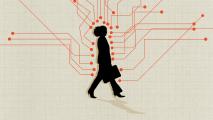A new research project is developing an AI-powered system to detect coronavirus infections based on a sample of a person’s voice — and it needs your help.
The Corona Voice Detect project is a collaboration led by Israeli inventor Shmuel Ur, natural language processing startup Voca.ai, and Carnegie Mellon University associate research professor Rita Singh.
The group is currently asking people to submit short voice recordings online to serve as the training data for a system that may be able to analyze a person’s voice for signs of coronavirus — remotely and for free.
“We are fully aware that people are dying across the world,” Singh said, “and we are in a race against time with whatever we can contribute with our AI-based technologies.”
Listen Closely
One of Singh’s areas of expertise is voice forensics — specifically, she researches the use of artificial intelligence to detect and measure features in a person’s voice that can reveal insights into everything from their mental state to their health.
These features, known as vocal biomarkers, can include changes in pitch, tone, or enunciation. While these changes can sometimes be too subtle for a person to hear, researchers have been able to train AI-powered systems to detect them.
“We needed to understand which aspects of voice likely carry coronavirus signatures — if at all.”
Rita Singh
In past studies, AIs have accurately predicted the development of psychosis and the likelihood that a person would have a heart attack.
A study involving MIT researchers, meanwhile, found that an AI system could detect signs of Parkinson’s disease in a person’s voice with 87% accuracy.
Collecting Data to Detect Coronavirus
Soon after the COVID-19 epidemic began, Ur reached out to Singh to ask if she thought it was possible to detect coronavirus through a voice test — and if she thought someone could rapidly develop such a test.
“My response was a ‘maybe,’ because this is a new disease, and I had not seen any data from it yet,” she said. “I could only best hypothesize and speculate based on my related work on building technologies for profiling humans from their voice.”
The pair agreed that they would need audio samples from both healthy people and those with the coronavirus before they could say for sure whether an AI could effectively detect coronavirus from a person’s voice.
Ur posted on Facebook asking for help with the project, and eventually, he connected with Voca.ai. The startup agreed to create a website for the project where people can submit their voice samples.
That site went live on March 18, and the team is now working around the clock using the collected data to evaluate the feasibility of an AI that can detect coronavirus from a person’s voice.
“We needed to understand which aspects of voice likely carry coronavirus signatures — if at all — and how they may best be extracted for automated processing,” Singh said.
Listening for Signs of Coronavirus
The group is “fairly sure” it’ll be able to create a system that can detect signs of coronavirus in a person experiencing symptoms, Ur said.
What’s still uncertain is whether the AI will be able to detect coronavirus before noticeable symptoms develop.
Ideally, the project will result in a system that could be set up so that anyone around the world could call a phone number or upload a voice sample online and find out if they are likely to have COVID-19. They could then contact a clinic for a swab test to confirm the AI’s suspicions.
Until the group gets its hands on the necessary training data, though, it won’t be able to say for sure whether Singh’s initial “maybe” is in fact “yes” or “no” — but the team plans to do everything in its power to find out the answer.
“We don’t know what will happen yet,” Singh concluded. “We may fail completely, but that doesn’t mean we won’t try.”






